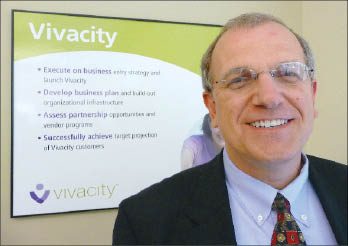Spokane physician heads new health-care company
Premera starts Vivacity to help employers find health-care cost savings

An affiliate of regional health-care insurer Premera Blue Cross has launched a subsidiary that will offer services to employers aimed at improving the health of their employees and reducing health-care costs—and has named a Spokane doctor to head the venture.
The new company, Vivacity Inc., is a unit of Ucentris Insured Solutions, an affiliate of Mountlake Terrace, Wash.-based Premera. Vicacity also is based in Mountlake Terrace, but its president, Dr. Dave Johnson, is based in the new venture's Spokane office, located in the Premera complex at 3900 E. Sprague. The new company also has offices in Juneau and Anchorage, Alaska.
Johnson has worked for Premera for 13 years, including most recently as regional medical director for Eastern Washington. Johnson, 51, also previously worked for Group Health Cooperative here and served Premera as corporate medical director for disease management, health-risk management, and population health.
At Vivacity, Johnson and a staff of seven assist employers in assessing their employees' health, then create and implement health plans and programs intended to improve those workers' health, and measure the plans' performance and outcomes, Premera says.
"Basically, our mission is to engage employers to create and sustain a work-site culture of health," Johnson says. "It's easy to create; it's very hard to sustain."
The company offers a host of unbundled products and services, such as a health-risk management program, which provides employers with reporting and behavioral change tools, and employees and their dependents with a personal health assessment and interactive, online tools that let them track and monitor their health. Other programs include smoking cessation and health coaching, the latter of which helps workers identify areas for health improvement and sets measurable, personalized goals to work toward.
Also, workers have access to biometric screening, a service that allows them to know their personal health indicators, which is information Johnson says is helpful for behavioral change and for understanding individual risk for serious chronic disease.
Vivacity charges its client employers on a fee-for-service basis, a monthly fee per employee, or by other methods, depending on the services they choose, Johnson says. Vivacity doesn't sell insurance plans.
The new company already is working with about 50 employers, located throughout the Northwest, some of whom are clients of Premera, he says. It hopes to start signing additional clients in coming months.
Vivacity's current customer base includes employers with between 200 and 6,000 workers, but it likely will target employers with between 1,000 and 5,000 employees, Johnson says. Clients include employers from a host of industries, including banks, law firms, and government entities, he says.
Johnson, who was a primary-care doctor earlier in his career, and has developed outpatient practice sites for a hospital system in the southeast, says, "Really, I was looking for an opportunity to affect more people, to help more people."
Vivacity offers customized health-improvement programs designed for the unique needs of each employer's work force. To do that, the company first assesses each employer's data—such as workers' compensation, disability information, employee attendance and productivity information, and health-risk assessment information.
"And we kind of create a picture for them—'This is what you look like, Mr. Employer, from a health perspective,'" he says.
With the employer's help, Vivacity develops targets for health improvement among the client's workers. For example, Vivacity and the employer, through coaching of a group of employees, might seek to reduce employee absenteeism related to health from an average of five days a year to three days.
Vivacity and an employer, he says, decide, "Where are we going to try to affect change. At the end of a year, two years, what are (the employer's) targets" that the company is going to want to have met.
Next, the employer and Vivacity build an action plan, or what Johnson calls a "road map," that describes how the targets are going to be reached, he says.
"And then we will walk with them along the way," with Vivacity helping to implement the road map, he says.
"We really want to build the infrastructure within the inside of an employer that will enable them to sustain" an environment intended to improve and maintain employee health and maximize productivity.
"It's not our goal to have to be there all the time," he says. "That's not going to work. We want that employer to create (and maintain) that culture of health."
Still, Vivacity will work with employers on the work-place culture, and with employees, he says.
The payoff for employers, Johnson says, is a reduction in medical claims costs, healthier and happier employees, and increased productivity.
"The financial cost associated with health care for employers is gigantic," he says. "And they need to try to manage that. We're going to serve anyone who has the need and who has the interest."
Related Articles




